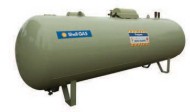 The main advantage Shell Gas (LPG) has over dieseI to power forklift trucks is that it is more suitable for use both inside and out. It means that an LPG powered forklift can move easily and efficiently between the two environments – a vital benefit to a business whose margins depend on getting the most out of the working day.
The main advantage Shell Gas (LPG) has over dieseI to power forklift trucks is that it is more suitable for use both inside and out. It means that an LPG powered forklift can move easily and efficiently between the two environments – a vital benefit to a business whose margins depend on getting the most out of the working day.
Compared to diesel, LPG is less harmful to the environment. Because it is dispensed from a sealed unit, there are no evaporative pollutants, nor any spillage risks. LPG also emits fewer harmful greenhouse gasses and pollutants such as unburnt fuel and soot. There are stringent hygiene laws in the food and pharmaceutical industries which have imposed strict controls in the workplace – with LPG, goods in these industries can be transported with less risk of contamination. All in all, it makes for healthier conditions for these goods – and a better working environment for forklift operators.
But the benefits don’t end there. LPG fuelled forklifts require less maintenance than their diesel powered counterparts,due to the cleaner burning properties of LPG. They are quieter and vibrate less too, thereby reducing noise pollution levels. Forklifts using LPG can run for longer periods between refuellings – they only require an average of three refuels a day, each taking approximately five minutes.
Efficient, versatile, cleaner burning and safe. It’s not surprising that results-driven businesses are making the move from diesel to Shell Gas (LPG) to fuel their forklift trucks.
Versatility
Diesel fuelled forklifts are best suited for outdoor operation. LPG powered vehicles are better suited to operating both inside and out.
Efficient
LPG is the more cost-effective solution due to reduced maintenance and the elimination of pilfering, spillage and evaporation. LPG is equally suited for lifting both light loads and heavy weights.
Environmental benefit
 Diesel liquids can contaminate the ground and diesel vapours contain carcinogens. Compared to LPG forklifts, diesel forklifts produce higher levels of contaminants such as particle matter, oxides of nitrogen, carbon monoxide and hydrocarbons. Using LPG instead of diesel to power forklifts can help to reduce forklifts’ greenhouse gas emissions.
Diesel liquids can contaminate the ground and diesel vapours contain carcinogens. Compared to LPG forklifts, diesel forklifts produce higher levels of contaminants such as particle matter, oxides of nitrogen, carbon monoxide and hydrocarbons. Using LPG instead of diesel to power forklifts can help to reduce forklifts’ greenhouse gas emissions.




Comments are closed.